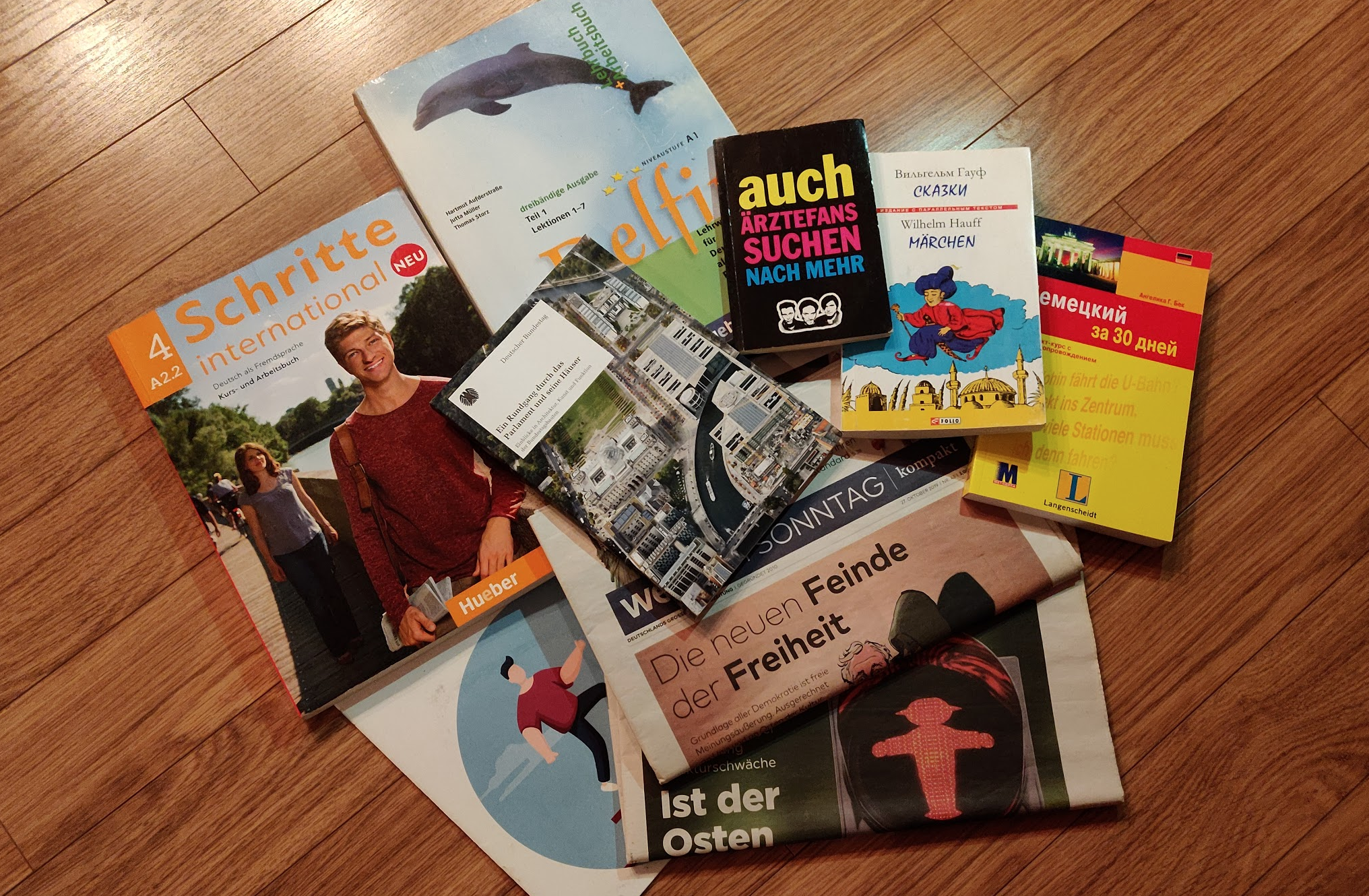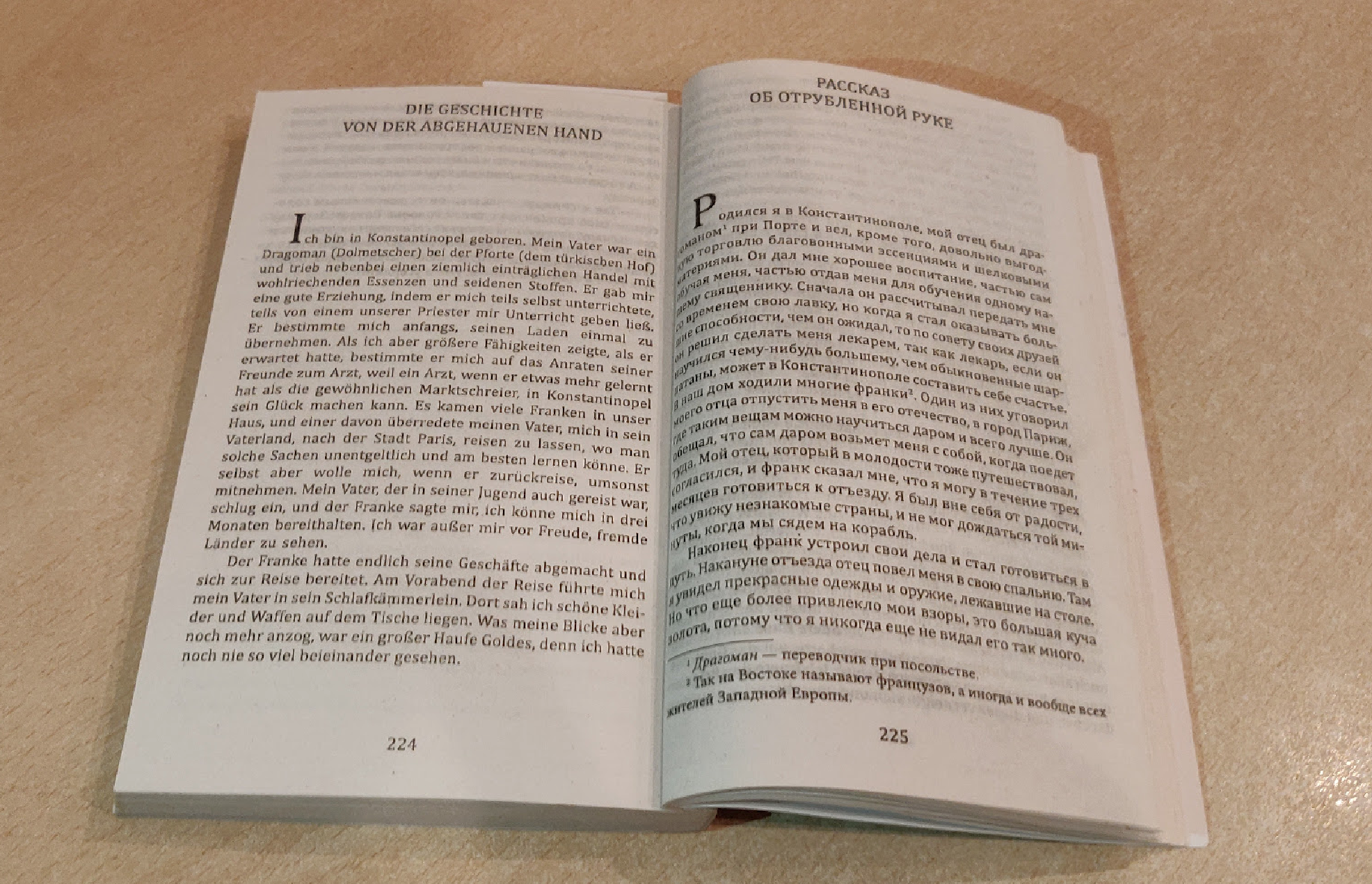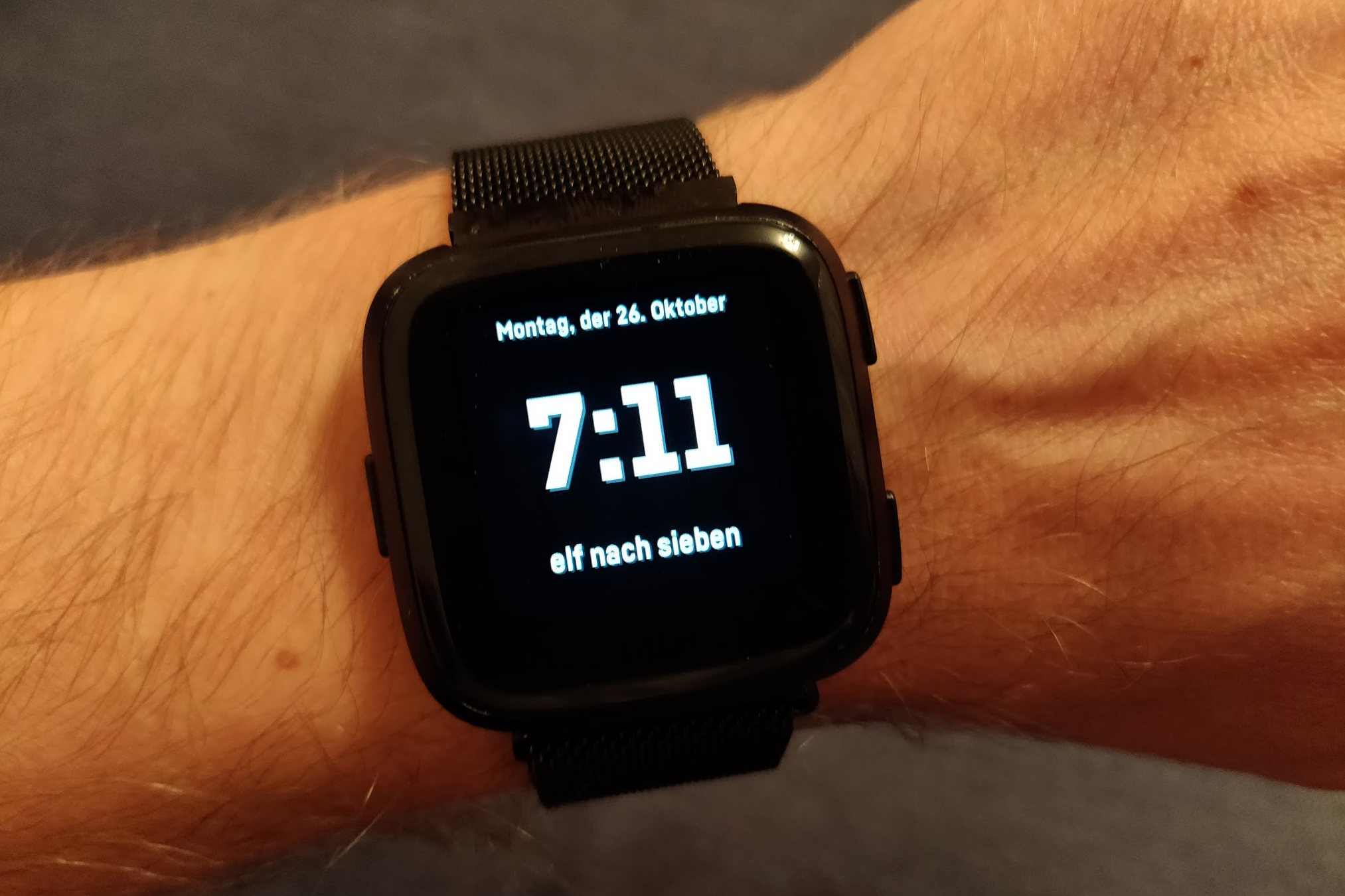My Two-Years-Long Journey in Learning German
When I started learning German I was curious about what I could expect from the language, how fast I would learn it, and what experience I would have. At the time, most of the stories I could find on the Internet were about people reaching fluency in half a year and guides about repeating their success. I would gladly read something close to how regular people learn. Learning English was tough. I didn’t expect German to be any easier. Now, after two years, I want to share my experience. I will try to explain my motivation, how I learn, what resources I use, how it went, how much it cost, and where I am right now. I do it for myself, but I hope other language learners might find it useful.

My motivation. I work as a software engineer, and I was interested in taking up a hobby that I would enjoy as much as programming. It had to be from a completely different area. Learning a language sounded like a good option. I was working for a German company at the time, and I was a frequent guest in Munich. German seemed a natural choice. I found a couple of German bands and tried listening to their music just to understand how the language felt to me. The idea was simple; if you cannot enjoy music in your target language, how do you plan on enjoying the language itself? It is a kind of test for a language. After a week of listening to German music and figuring out the texts, I was convinced that it was what I was looking for.
Music. Beyond my starting point, I continued to listen to music in German. I would assume it makes up 90% of all the music I listen to, and I do not regret it. It is quite different from music in other languages. Oftentimes, songs would cover social issues I didn’t know about in their region. For instance, there is a whole cluster of songs about life in East Germany before the unification. This one is absolutely great. It really helped me to personally learn more about the subject. Another difference that I find interesting is that songs might often be “unpredictable”. You listen to a song, you don’t know the language, so you cannot understand the song, but you like it. Then you look for the lyrics, and you’ll often be surprised that they sing about something completely different than you originally thought. It happens all the time, and it is always a surprise. If you don’t know what I mean, try this song or this. I would say music is one of the best motivators to keep learning.
Working with a teacher. I am not a person who can learn a language by myself, and that’s why I found a teacher. We would work two hours a week, and I would spend an hour preparing for every lesson we had. I wish I could work regularly with my teacher. The reality is that I often have to cancel a lesson, or I have to postpone our lessons for a long period of time. Once it was for three months and at the moment of writing this text I haven’t seen her for two months. Nevertheless, we managed to complete A1 and A2 within the last two years. First, we worked with a book called Delfin Lehrwerk für Deutsch als Fremdsprache. For A2, we decided to go with a different book - Schritte International NEU - which was newer (people don’t use paper maps anymore and iPhones are a thing). The new book had two parts for A2.1 and A2.2. It turned out half of the materials of A1.1 was already covered by my previous book. The other half was new, but I used the new language constructions here and there, so we decided to jump to A2.2.
Here are some of my materials:

I must say that working on home assignments sometimes isn’t that interesting, and from time to time I would “sabotage” completing the exercises. On the flip side of the coin, it is probably the most valuable part of the process.
Communications. The other important part was communication with native speakers. I found people who were interested in language exchange on Reddit and conversationexchange.com. I did it after I had been learning German for two months. With my current level at the time, I could say who I was and what the weather was like in my location. However, there was another guy who was eager to help me. We used Skype for video calls. During the first few months, we would speak ten minutes in German and then an hour in Russian because ten minutes is the longest I could talk in German. I understood that it was better to be prepared otherwise I would end up talking about things we already discussed several times. Talking to a native speaker even in the early stages helps a lot. It helps to understand what parts of the language are the most important in order to keep the simplest communication. For instance, right away I needed to learn and incorporate past tense usage (how else would you explain how your day was?) However, they are taught only at the end of A1. Having used past tense with my friends, I only summarized them by the book when we were learning this part.
A half a year later, I met another guy from Germany who lived in Kyiv and was learning Russian and Ukrainian. We would meet in person and take long walks in the city center discussing different topics from computer science to life in different countries. Sometimes he would talk to me in German and I would reply in Russian. This way we would be able to understand each other a bit better. He returned to Germany, but we still keep in touch.
I meet my German friends online 3-5 times a month. It helps a lot in practicing the material I learn with my teacher. It also brings joy. Being able to talk to my friends in their native language is the biggest reward for me.
Media. Another activity that I try to follow is watching TV shows in German. It is fairly simple. I just switched to watching German TV shows on Netflix. I don’t know how much it helps. Probably not that much considering my current level. However, it makes me feel more confident when I understand phrases before I read the subtitles (in Russian). I must admit it is quite tough. It would probably take me a few years until I’ll be able to understand them without subtitles. As I said, I do it for the joy that’s why I don’t mind that it could not be efficient enough.
Podcasts and Radio are also part of my daily routine. Unlike TV shows, it is way easier to understand them. I like podcasts from Die Zeit magazine. They have many and all are great. Of course, I don’t understand many words and phrases, but I am happy when I get the concept and follow the conversations. With radio, it is even simpler. I listen to news stations, mainly B5 Aktuell. They mention many names which help get the context better. They also repeat the same news several times a day while adding more details. Sometimes I would not understand the news the first time I listened, but the next time I suddenly understand almost everything. Radio and podcasts become a way of consuming information rather than learning. I am so thrilled that it’s working for me.
I am also subscribed to several German-speaking Twitter accounts. People often use informal language or dialects on there, and it is always interesting to read such tweets and try to find out what all those words could mean. Once I came across a Twitter thread which was hard to comprehend and the shortcuts were unusual. However, it was somewhat readable. Then I learned that it was in the Luxembourgish language which is a different language.
Books. I try reading simple books. It is quite hard. Although bilingual books (books where every page is written in two languages) help make it much easier. I have a book of fairy tales by Wilhelm Hauff. It is supposed to be easy-reading because the texts are written for children. However, it is much more complicated than that. First, there is a huge amount of words you’d never use in real life because the texts are from 1800s. Second, the author used long, complex sentences. Taking into account the German grammar, I would often sit and try to figure out which part of a sentence relates to what. A translation would always help.

Despite the complexities, the fairy tales were great. I couldn’t read them fast, and I always had the feeling I couldn’t wait to finish reading a tale. I also learned new concepts from this book; structure of complex sentences, the past simple tense (which is rarely used in verbal communications), names of animals, and indirect speech (constructions with “sei”).
Applications. Within the past two years, I tried a dozen different applications for learning languages, but I only actively use three of them. The first one is a dictionary app called dict.cc. I like it because it provides different options for translations as well as the most common usages of any given word. The other app is called Reverso Context. It allows you to search for usages of phrases or language constructs in real texts. For example, if I am not sure how to say something I would search if someone else has used such a construction. And the last one - Verben. It is a database of verb forms. I also tried Anki cards, Duolingo, and some other apps that many find useful. In my case, though, they were not. Anki is really helpful, but I couldn’t force myself to use the app. Duolingo was simply boring.
Because I am a software engineer, I also created a small application that helps to learn to tell the time in German. It is a Fitbit clock face that would show time in text format so that a person could learn it. I was creating it for myself in the first place, but I learned the subject before I completed creating the application. What’s funny about this is that there was a mistake and people would leave low ratings for the app, but none wrote why they left a bad rating, so I couldn’t guess what was wrong. Later on, I corrected the mistake, and I started receiving positive feedback.

Traveling. I thought if I visited German-speaking countries I would be able to progress faster. It was a mistake. It certainly helps me stay motivated. Additionally, I wasn’t able to use German much except ordering food and checking in to a hotel. Once we were in a popular Café in Vienna where we were offered to share a table with tourists from Germany (it was a place with a line in front of the door), I could talk to them in German. But eventually, their desire to practice English was stronger than my poor German, and we switched to English.
Surprisingly, I could use German in countries where people generally don’t use German. I’ll tell you about this experience in audio in German. This way you will hopefully have an idea on what my language learning level is.
I prepared this text and then recorded it. I did not correct my mistakes. I did not use any resources either so that it could showcase my level more authentically.
Costs. Altogether, I invested 35 425 UAH in learning. It is around 1100 EUR by the current exchange rate. The sum includes money that I paid for 110 private lessons with my teacher and four books that I purchased. Out of the three I mentioned before, one of them was called German in 30 Days (I didn’t work with it much though). I don’t count the money I spent traveling to Germany and Austria. If not in these countries, I would have spent my vacations somewhere else.
Summary. After two years of learning German, I reached A2 (some say I have B1, but I have never taken a test); I found new friends; I discovered a whole new music universe; I am able to talk to people in German; I can consume media in German, and most importantly, I had a lot of fun learning the language. Most likely, I could have progressed faster, but I would have to scarify my time by doing something I don’t enjoy.
If you managed to read to this point, I hope you found something interesting for you. Please tell me what you think in the comments. If you have any questions I will gladly respond to them!
Viel Spaß beim Deutschlernen!